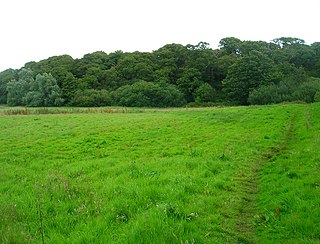
Øyeren is a lake in the Glomma River watershed, southeast of Lillestrøm. It is located within the municipalities of Enebakk, Skedsmo, Fet, and Rælingen in Akershus county and Spydeberg and Trøgstad municipalities in Østfold county.
Alverstone Marshes is an 83.8 hectare biological Site of Special Scientific Interest on the Isle of Wight, notified in 1951.

America Wood is a 21.4 hectare biological Site of Special Scientific Interest on the Isle of Wight, notified in 1986. Legend has it that the name derives from the use of oak trees grown here to build ships utilised in the American War of Independence. However, the name Americas Wood appears on Andrews Map of the Island in 1769, six years before the outbreak of the War of Independence.
Cowpen Marsh is a 116.8 hectare biological Site of Special Scientific Interest in County Durham, England notified in 1966. SSSIs are designated by Natural England, formally English Nature, which uses the 1974–1996 county system. This means there is no grouping of SSSIs by Stockton-on-Tees unitary authority, or County Durham which is the relevant ceremonial county. As such Cowpen Marsh is one of 18 SSSIs in the Cleveland area of search.
Hart Bog is a 1.79 hectare biological Site of Special Scientific Interest in County Durham, England notified in 1968.
Seal Sands is a 294.37 hectare biological Site of Special Scientific Interest in County Durham, England, notified in 1966.
Seaton Dunes and Common is a 312.1 hectare biological Site of Special Scientific Interest in Hartlepool, County Durham, England notified in 1966. Part of it is a Local Nature Reserve.
Pinkney And Gerrick Woods is a 62.7 hectare biological Site of Special Scientific Interest in North Yorkshire, England notified in 1954.
South Gare & Coatham Sands SSSI is a 381.2 hectare biological Site of Special Scientific Interest in North Yorkshire, England notified in 1971.

Viaduct Quarry is a 0.3 hectare geological Site of Special Scientific Interest near Shepton Mallet on the Mendip Hills in Somerset, notified in 1984.
Friar's Oven is a 4.0 hectare biological Site of Special Scientific Interest in Somerset, notified in 1989.
Sandpit Hole and Bishop's Lot is a 1.8 hectare geological Site of Special Scientific Interest near Ebbor Gorge in Somerset, notified in 1987.

Vallis Vale is a 23.9 hectare biological and geological Site of Special Scientific Interest near Great Elm in Somerset, notified in 1952.

Brenscombe Heath is a 34.7 hectare biological Site of Special Scientific Interest in Corfe Castle, Dorset, notified in 1985.

Lonjsko Polje is the largest protected wetland in both Croatia and the entire Danube basin. It covers an area of 505.6 square kilometres (195.2 sq mi), extending along the river Sava from the areas east of Sisak, the lower course of the river Lonja for which it is named, to the areas west of Nova Gradiška, along the course of the river Veliki Strug.
Old Burghclere Lime Quarry SSSI is a 4.61 ha biological Site of Special Scientific Interest at Burghclere in Hampshire, notified in 1979. The Lime Quarry was actively worked until the beginning of the 20th century, and since then has been left to nature, resulting in a unique mix of flora and fauna becoming established at the site.
This page is based on this
Wikipedia article Text is available under the
CC BY-SA 4.0 license; additional terms may apply.
Images, videos and audio are available under their respective licenses.






